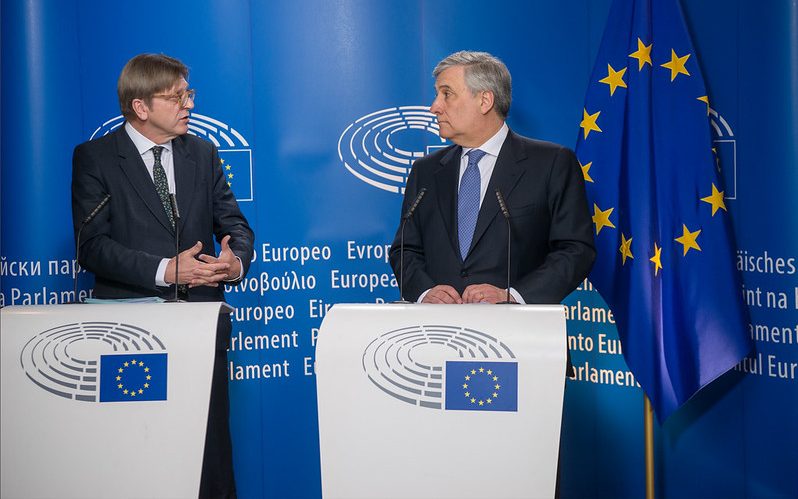Introduction
‘I have two friends. An astronaut and a truck driver. I like the truck driver more because he seems more down to earth than the astronaut.’ (Truck Driver Jokes, 2021).
This humorous remark at the beginning of the article aims to allude to the current challenges the UK is facing due to Brexit, аs lorry driver shortage is reported to be one of them. Essentially, this read aims to examine various political, philosophical, economic, legal and social issues, which may arise in this prodigiously intriguing series of events. Lorry driving is just a part of the bigger picture, but the article starts with this particular issue as it brings forth some other thought-provoking topics.
With regard to the joke mentioned above, it is interesting to note what Transport Secretary of the UK, Grant Shapps, previously said in relation to the lorry driver shortage in the UK: “We do have to stand on our own two feet as the United Kingdom” (Reality Check Team, 2021). A Road Haulage Association (RHA) survey of its members estimates there is now a shortage of more than 100,000 qualified drivers in the UK. That number includes thousands of drivers from European Union (EU) member states who were previously living and working in the UK (Reality Check Team, 2021). This number is undoubtedly disquieting but it would be naïve to claim that Brexit is the sole reason for these vicissitudes. Some EU countries are also said to be encountering similar problems. Henceforth, solutions should be proposed as a thorough examination of each prerequisite is being made. Other preconditions, which can be pointed out, include the Covid-19 pandemic, tax changes, low wages and poor working conditions (BBC News, 2021). Increasing the wages of workers can be a stimulus to be considered but it seems that working conditions are less and less regarded as a key factor and that is why we can fasten our attention upon this issue as well. It looks as though nowadays, people’s lives, the quality of their work, their attitude and even their opinions and emotions tend to be estimated in numbers, simplified patterns and computerized algorithms. However, there is more to one’s existence than simply producing and consuming and since people spend a huge amount of their time working, it is essential that this work does not turn people into withering beings or mechanical tools whose sole purpose in life should be increasing material gain. In his article ‘Theorie de Quatre Movements’ Charles Fourier explains the most complicated and detailed theory and diagnosis of society. He founds the whole understanding of society on man and his passions and he believes that a sane society is one that serves not that much to improve material wellbeing than to fulfil our main passion, brotherly love. Apart from other human passions, Charles Fourier emphasizes the meaning of “the passion of the butterfly”- the human necessity to change, which corresponds to the many different opportunities, which can be found in every human being. He contends that labour should be a pleasant activity (“travail attrayant”). (Fourier, 1851, cited in Fromm, 1955). As a matter of fact, there is a plethora of suggestions, which can make a particular job look attractive. For instance, when it comes to lorry driving, the so-called ‘smart trucking’ idea might be taken into consideration. It brings in the idea of co-driving. There can be numerous advantages to such proposals, as driving with a partner can turn a dull and exhausting day into an amusing adventure. First and foremost, in this way, one can always have somebody to rely on, should any obstacles transpire. What’s more, having the freedom to choose one’s driving partner can be incredibly motivating. Supposing two drivers shared the same musical taste or some other interests, a similar sense of humour, etc., they would gladly listen to their favourite albums together or share some thoughts that they hold dear during their drive, thus turning their not so exciting work into a pleasant journey. Oliver Burkeman cites the psychologist Edward Hallowell, who conclusively remarks: ‘It’s just a fact of human nature. We’re better in connection than in isolation.’ This works with worry, as with any area of life. ‘If you’re in a big room alone in the dark, you feel frightened,’ Hallowell said. If you’re with someone else, you laugh.’ (Burkeman, 2011, p.34). In fact, this is just a simple example, but such ideas and many other inventive suggestions should be at the core of the working process no matter what kind of industry we are talking about in order not only to boost productivity and maximize profit but also to make work more attractive and satisfying. As a result, one may exclaim facetiously, quoting the words of playwright Noël Coward: ‘Work is more fun than fun!’
Multiple challenges due to Brexit
Admittedly, besides touching upon the social dimension of the lorry driver shortage, having taken into account the fact that the number provided by the RHA includes thousands of drivers from European Union (EU) member states who were previously living and working in the UK, the multiple challenges, which are posed because of Brexit, cannot be overlooked (Reality Check Team, 2021). What’s more, this is already affecting other industries such as food processing and fruit picking. To concretize, one cannot turn a blind eye to the complications that are being caused by Brexit in various industries, at least in the short term. For example, the agricultural sector is already experiencing some difficulties because of the divorce between the UK and the EU. Some of the hindrances that are reported to be taking place include increased red tape, incidents of food wastage due to approval delays, reduced workforce, higher supply chain costs and uncertainty about farm payments. On top of that, losses for the sheepmeat industry and higher costs for local produce are expected. Prices of local produce may soar because British farmers can no longer have access to the EU Common Agricultural Policy subsidies, the cost of operations is higher and the existing procurement conditions will also add costs to the crop from EU countries in the UK market, meaning the overall food cost will increase. (Shields, 2021). The UK’s odyssey has yet to be assessed, but there is a panoply of issues, which can be analyzed.
A group of neo-liberal British economists argue that Brussels’ bureaucratic red tape is stifling British companies. Even non-exporting British enterprises had to obey EU rules on standards, employee rights, union participation, health and safety, paternity leave, and other bureaucratic red tapes, which is a hardship on small businesses. (Hamza, W.A., 2021). However, one can argue that all of these high-standard requirements laid down by EU law are a corollary to respecting certain fundamental rights as well as general law principles and the act of giving rise to crucial elements such as health, safety, good working conditions, etc. shall not be put at risk. Nevertheless, no business would embrace red tape and other obtrusive measures with an impervious smile. In this respect, it is important to underline the significance of the principle of proportionality in the EU legal order. Pursuant to Article 5 (4), TEU: ‘Under the principle of proportionality, the content and form of Union action shall not exceed what is necessary to achieve the objectives of the Treaties.’ (Treaty on the European Union, Official Journal of the European Union, 2012). It is vital that this provision be read in relation to Article 5 of the Protocol on the application of the principles of subsidiarity and proportionality, according to which: ‘Draft European legislative acts shall take account of the need for any burden, whether financial or administrative, falling upon the Union, national governments, regional or local authorities, economic operators and citizens, to be minimized and commensurate with the objective to be achieved.’ (Treaty on the European Union, Official Journal of the European Union, 2004). Additionally, the Court of Justice of the European Union has expressly stated that: ‘According to settled case-law, the principle of proportionality requires that acts of the EU institutions be appropriate for attaining the legitimate objectives pursued by the legislation at issue and do not exceed the limits of what is necessary in order to achieve those objectives; when there is a choice between several appropriate measures, recourse must be had to the least onerous, and the disadvantages caused must not be disproportionate to the aims pursued (British American Tobacco (Investments) and Imperial Tobacco, 2002). Subsequently, the role of national parliaments concerning the principles of subsidiarity and proportionality, as well as the fact that the validity of the acts of EU institutions can be contested by reason of infringement of these principles, should be taken into account. Notwithstanding, the effectiveness of the provisions of The Protocol on the Application of the Principles of Subsidiarity and Proportionality can be a subject of further debate.
Nevertheless, the UK is currently trying to look for creative solutions to some of these problems and in doing so, it is trying to manifest its capability of tackling the bureaucracy issue better than the EU. Some proposals include: helping to ensure regulations do not impose excessive burdens on businesses or consumers or scrapping poor proposals for regulations before they become law. In addition to that, their impact could be measured through a swifter mandatory review of regulations two years after they are introduced, rather than after five years – repealing or adjusting them more quickly where they are not working as they should, are too burdensome or cost too much. Another proposal suggests reviewing the role of regulators, including placing a duty on the regulator to promote innovation and competition – ensuring they contribute to the UK’s economic growth while enforcing the rules and protecting people’s rights. (Cabinet Office, The Rt Hon Lord Frost CMG, and The Rt Hon Kwasi Kwarteng MP , 2021).
Meanwhile, after breaking up with the EU, the UK is trying to turn over a new leaf and woo some potential trade partners such as Canada, New Zealand and Australia. The latest agreement the UK has concluded is the free trade deal with New Zealand. The essential question that arises here, however, is whether this intensified trade cooperation with the aforementioned countries is capable of compensating the disadvantages linked with leaving the Single Market. In this regard, it is important to highlight the fact that before Brexit, the EU was the UK’s largest trading partner, accounting for 47% of total trade, while Canada, Australia and New Zealand combined made up only 3.5%. (Kohnert, D., 2021). Indubitably, trade barriers between the UK and the economic titan, which it used to be a part of, can have a largely unpleasant impact on the UK economy and there are some additional challenges that follow up. One of the issues that entail considerable obstacles refers to geographical distance. Following this train of thought, we cannot but pay attention to some watersheds in economic theory. One of them is the so-called ‘gravity equation’. The gravity equation in international trade is one of the most robust empirical findings in economics and it states that: bilateral trade between two countries is proportional to their respective sizes, measured by their GDP, and inversely proportional to the geographic distance between them.’ The empirical evidence for the gravity equation in international trade is strong. Both the role of distance and economic size are remarkably stable over time, across different countries, and using various econometric methods. (Chaney, 2021). Unquestionably, transport costs, non-tariff and probably other barriers can be a fly in the ointment since no matter how alluring trade agreements with countries such as Canada, Australia and New Zealand seem to be, they cannot possibly replace the tremendous advantages of remaining in the EU Single Market.
Furthermore, according to The National Farmers’ Union, post-Brexit deals could cause irreversible damage ‘to British farmers since British agriculture will no longer be under the wing of the CAP (Common Agricultural Policy) of the EU. (Kohnert, 2021).
Understandably, all of the conundrums and misgivings at hand have a lot to do with yesterday’s close connection between the UK and the EU in every sense. This long-lasting relationship, linked with the work of innumerable citizens, established businesses, artists, scientists and the like, may not be easily redirected. Even though there is an established agreement between the EU and the UK, the ensuing changes create some immediate hindrances for citizens and undertakings. It is true that The Trade and Cooperation Agreement (TCA) has outlined the important perspectives, which are supposed to facilitate trade, guarantee the rights of UK citizens and EU nationals who before 31 January 2020 were living/working in the EU and the UK, respectively and it confirms that the UK will still take part in some EU programmes.
Nevertheless, as one encounters the complexity behind the rules of origin, non-tariff barriers and waterfalls of paperwork, it isn’t hard to conclude that these restraints must be getting in the hair of numerous businesses.
It is also quite unsettling that a lot of artists are coming up against some difficulties on account of restrictions on the freedom of movement of persons. EU citizens make up 6.7% of the UK’s creative industries workforce in general, but that number rises as high as 30% of visual effects workers and 25% of architects when specific sectors are considered. (Dr Mattocks, 2021). Indisputably, discouraging musicians and all sorts of cultural professionals from promoting their art and deterring them from working in close cooperation with people from other countries who work in their sector and especially those who have managed to keep close ties over the years does not affect only the persons at issue. It impacts every EU citizen as well as every UK citizen. Missing out on one single talent is already a huge loss for our society since it is mainly art and culture that elevate our souls, nurture our minds, truly lead us to progress and to a large extent imbue our lives with meaning.
To conclude, the impact of Brexit has yet to be estimated in detail as various aspects of the topic are examined. Nonetheless, there are some immediate consequences, and it is hard to suggest that in its strive to ‘stand on its own two feet’, the UK will manage to fall on its feet. Jokingly, one can remark that maybe that’s why more “down-to-earth” lorry drivers are needed). Perhaps the central motive that pushed the UK towards Brexit was the unflinching endeavor for independence, but even when the UK was still a member state of the EU, it has always been the willful child of the block. This adamant attitude has been driving integration supporters up the wall for years, but from a realist theory’s perspective, it has served most of the UK’s national interests well. Some examples include the legendary UK Rebate, negotiated in 1985 as well as the UK position in terms of the Schengen agreement as it had agreed on incorporating the Schengen acquis into EU Law on the condition that the UK may opt out and in the meantime the UK would cooperate with Schengen states in certain fields. It is also worth mentioning that thanks to the UK’s vital interests, the European Regional Development Fund, which aims to enhance economic, social and territorial cohesion, was created. From this point of view, one can emphasize the importance of good negotiation skills and a deep understanding of what national interests require in given circumstances. The UK could have used these instruments to its advantage, had it decided to remain in the block. Having taken into consideration the crucial decisions, EU institutions take, the fact that the UK can no longer influence the direction and the nuances of these decisions pose more questions. In the midst of a global health crisis, economic and social challenges as well as energy issues the UK is forced to take a variety of measures and it would not be a surprise if its foreign policy strategy presupposes rethinking or reshaping its policies with regard to its relations with the EU.
Conclusion
In short, the UK needs a whole lot of foresight as far-reaching foreign policy decisions are underway. Numerous pressing problems require sagacity, flexibility, industriousness and staggering negotiation skills. It is essential that proper assessment of current policies be made and getting to the root of the problem along with choosing the right panoply of “medications” that may successfully treat the affected areas of UK political life is more than necessary. Incontrovertibly, the perturbing sword of Damocles, hanging over the UK’s head, is the Northern Ireland Protocol and the possibility of triggering Article 16 thereof. It sets out the process for taking unilateral ‘safeguard’ measures if either the EU or UK concludes that the deal is leading to serious practical problems or causing diversion of trade. (Campbell, J., 2021). Firstly, the fact that the USA is more willing to strike a trade agreement with the UK, should it smooth out the problems concerning the Northern Ireland Protocol, should result in an additional stimulus for the UK to develop fruitful negotiations likewise with the EU. Another crucial point that ought not to be missed is the importance of eschewing positional bargaining since, more often than not, this would lead to a hurting stalemate. In their remarkable book ‘Getting to Yes’ Roger Fisher and William Ury provide us with invaluable pieces of advice when it comes to negotiating. They present the advantages of not attacking the confronting position but rather, endeavouring to look behind it. As in Oriental martial arts of judo and jujitsu, Fisher and Ury suggest that you avoid putting your strength against theirs directly. Instead, they suggest that you use your skill to step aside and turn their strength to your ends. Rather than resisting their force, channel it into exploring interests, inventing options of mutual gain, and searching for independent standards – they suggest (Fisher, Ury, 1981). Fisher and Ury continue by emphasizing the interests behind a certain position and how important it is to seek out the principles which it reflects as well as thinking about ways to improve it. Another key point that stands out lies in discussing with the other party what would happen if one of their options was accepted, as you direct their attention toward improving the options on the table. (Fisher, Ury, 1981). In the EU-UK case, the optimal decision is supposed to find a solution to the tumultuous situation at the Northern Ireland border in such a way that the Good Friday Agreement may not be put into jeopardy. Meanwhile, no matter how resourceful a proposal the EU can come up with, it can by no means allow a de facto backdoor to the Single Market. To quote professor Kalypso Nicolaïdis’ article from 2017, as it stands, the problem with the Brits as seen from Paris is that they are, well, too French – avoir le beurre, l’argent du beurre et les baisers de la fermiere (loosely translated as “wanting not only to have their cake and eat it but also to kiss the baker’s daughter”). (Nicolaïdis, 2017).
Certainly, this time they must be more realistic and eventually, they might as well be forced to be satisfied only with a cake. However, as far as creative thinking is concerned, why not a cake and a handshake?
Sources Judgement of 10 December 2002 British American Tobacco (Investments) and Imperial Tobacco, Case no. C‑491/01, EU: C: 2002:741, paragraph 122 Burkeman, O., (2011), Help! How to become slightly happier and get a bit more done, first published in Great Britain in 2011 by Canongate Books Ltd, 14 High Street, Edinburgh EHI ITE, Canongate Books Cabinet Office, The Rt Hon Lord Frost CMG, and The Rt Hon Kwasi Kwarteng MP, (22 July 2021), UK to seize Brexit opportunities and unleash innovation by overhauling approach to red tape: 22 July 2021, GOV.UK, Available at: https://www.gov.uk/government/news/uk-to-seize-brexit-opportunities-and-unleash-innovation-by-overhauling-approach-to-red-tape-22-july-2021 , Accessed: 22 October 2021 Chaney, T., The Gravity Equation in International Trade: An Explanation, University of Chicago, NBER, CEPR, September, 2011 (online), Available at: https://www.tse-fr.eu/sites/default/files/medias/doc/by/chaney/distance.pdf), Accessed: 28 October 2021) Campbell, J., (5.11.2021), Brexit: What is Article 16 of the Northern Ireland Protocol?, BBC News, Available at: https://www.bbc.com/news/uk-northern-ireland-58790419 , Accessed: 8 November 2021) Fisher, R., Ury, W., (1981), Getting to yes. Negotiating an agreement without giving in, 2nd edn. Random House Business Books, p.55, Available at: file:///C:/Users/user/AppData/Local/Temp/Getting_to_YES_Negotiating_an_agreement.pdf, Accessed: 15 November 2021 Fourier, C., 1851, cited in Fromm, E. 1955, The Sane Society, Sofia, Zahary Stoyanov Publishing, 2004, p.260, transl. by me Hamza, W.A., (2021), To which extent did Brexit impact the British economy?, IOSR Journal of Business and Management (IOSR-JBM), Volume 23, Issue 26, Ser. X (online), Available at: https://www.researchgate.net/profile/Walid-Abouzeid/publication/354248721_E2306103036/links/612e451ac69a4e48796e4cc6/E2306103036.pdf , Accessed: 16 October 2021 Kohnert, D., (8 July 2021), Brexit and CANZUK: Expectations versus Reality, UK in a Changing Europe, Available at: https://ukandeu.ac.uk/brexit-and-canzuk/ , Accessed: 23 October 2021 Dr Mattocks, K., (6 April 2021), Brexit: Impacts on the arts and culture, UK in a Changing Europe, Available at: https://ukandeu.ac.uk/brexit-impacts-on-the-arts-and-culture/, Accessed: 2 November 2021 Nicolaïdis, K., (18 January 2017), Brexit arithmetics: a logical approach to predicting a Brexit deal, University of Oxford, Available at: https://www.ox.ac.uk/news-and-events/oxford-and-brexit/brexit-analysis/brexit-arithmetics, Accessed: 8 November 2021 Reality Check Team, (2021), How Serious Is The Shortage Of Lorry Drivers?, BBC News, 13 October (online), Available at: https://www.bbc.com/news/57810729, Accessed: 14 October 2021 Shields, R. 2021, The Early Impact of Brexit on UK Agriculture, Agricultural Recruitment Specialists, (online), Available at: https://www.agrirs.co.uk/blog/2021/08/the-early-impact-of-brexit-on-uk-agriculture, Accessed: 15 October 2021 Treaty on the European Union, Official Journal of the European Union, (26.10.2012), Consolidated Version of the Treaty on European Union (online), Available at: https://eur-lex.europa.eu/resource.html?uri=cellar:2bf140bf-a3f8-4ab2-b506-fd71826e6da6.0023.02/DOC_1&format=PDF , Accessed: 16 October 2021 Treaty on the European Union, Official Journal of the European Union, (16.12.2004), Protocol on the Application of the Principles of Subsidiarity and Proportionality) (online), Available at: https://ec.europa.eu/info/sites/default/files/protocol_no_2_on_the_application_of_the_principles_of_subsidiarity_and_proportionality_dec2004_en.pdf , Accessed: 21 October 2021 The 103+Best Truck Driver Jokes-UPJOKE, Truck Driver Jokes, Available at: https://upjoke.com/truck-driver-jokes Accessed: 14 October 2021 UK Visa Plan Will Not Fix Lorry Driver Shortage, Says Boss, BBC News, 27 September (online), Available at: https://www.bbc.com/news/business-58709018 Accessed: 14 October 2021







Be First to Comment